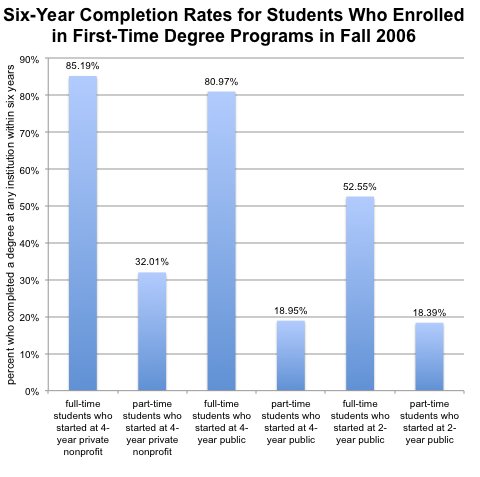
CATHERINE RAMPELL
Dollars to doughnuts.
In response to my post on Tuesday about college completion rates, a reader named Mark Elliott wrote in with a good point: that some of these students are enrolled part time, so maybe it’s not so unrealistic for them to take longer than six years to graduate.
Fair, although if you break down the figures by part-time/full-time status and school, I would argue that the completion rates are still not particularly impressive.
 Source: National Student Clearinghouse Research Center.
Source: National Student Clearinghouse Research Center.
For full-time students who originally enrolled at a four-year public institution — in other words, a school whose curriculum is designed for graduation within four years — one in five did not graduate within six years. For their counterparts at private four-year schools, about one in seven didn’t graduate within six years.
The record at two-year schools is much worse. For full-time students who originally enrolled at two-year schools, only about half had graduated with some degree within six years — that is, within three times the advertised schooling duration. (Of those who graduated within six years after enrolling at a two-year school, for most their first degree was a two-year degree. About 12 percent of those who started out at a two-year school received their first degree from a four-year school.)
As other readers observed, there are a lot of reasons that students are not finishing their programs on time, if they ever do. Academic struggles, debt and family responsibilities all play roles. The perceived opportunity cost of not graduating also matters, even though over the long run a college degree brings in a much higher return than the cost of the debt associated with it.
A new study, for example, finds that men are less willing to tolerate loan debt than women are. The authors argue that in the short term men without college degrees can find jobs that pay about the same salary as those for college graduates, which makes going directly to work and forgoing additional debt a very tempting proposition. The same short-term career options are generally less available for women. (Women who drop out of college are more likely to work in low-paying service jobs, while male dropouts are more likely to find positions in higher-paying, male-dominated fields like manufacturing, construction and transportation.)
Article source: http://economix.blogs.nytimes.com/2013/02/28/a-closer-look-at-college-completion-rates-for-full-time-students/?partner=rss&emc=rss